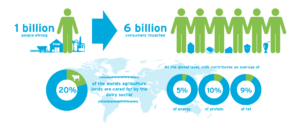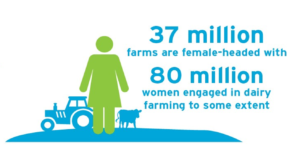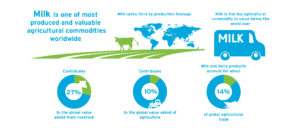NMPF’s vice president for government relations, Paul Bleiberg, discusses the potential for a Senate agricultural labor bill this year — and NMPF’s member fly-in to discuss the issue with individual Senators — on the Adams on Agriculture podcast.
Author: Alan Bjerga
Coronavirus Fact Sheet
Working to Improve Dairy Labor, Inside and Outside Washington
As the voice of dairy farmers in Washington, the National Milk Producers Federation constantly works for policy solutions to help our members succeed. As an organization that advances the interests of dairy farmers and the cooperatives they own, we strive to help producers meet their evolving needs regardless of the prevailing policy environment in Washington. Our ongoing efforts to improve dairy’s labor situation are a clear example of both priorities at work.
Agricultural labor reform legislation is a top Washington priority for us in 2020. We’re doing all we can to advance the policy process even though it’s a contentious election year. We’re also building the new FARM Workforce Development program, which will give farmers tools to better manage their workforce needs in the here and now. One effort aims to create a reliable ag worker program that would alleviate labor shortages and allow for future growth; the other focuses on human resources and safety management to ensure the highest quality dairy workforce here and now. The dual approach embodies NMPF’s comprehensive, farmer-driven problem-solving.
About farm-labor legislation: We celebrated a win last December when the House of Representatives passed its first ag-labor bill since 1986. The initiative created a workable guest-worker program for year-round agricultural sectors, including dairy, and offered a vehicle that can be improved and reconciled with any bill on this topic the Senate passes this year. But of course, key to that strategy is actual Senate passage – and on that front we are working diligently to pave a way forward.
We’re anticipating a Senate bill will be introduced this spring containing changes to the H-2A visa program so it can work for dairy – and stabilization of our current workforce. Observers of behind-the-scenes negotiations expect that the Republican-led Senate will likely make improvements to H2A that build on the House’s initial effort. Indications are that USDA is working to keep ag labor reform on the agenda and that the White House has spoken with Republican senators on this topic, suggesting that a compromise is still possible.
Any Senate bill would likely need to be considered before Congress leaves for its summer recess to have a chance to be reconciled with the House legislation in time for final congressional approval this year. We’re making sure dairy’s voice is heard throughout the process – including by having a large group of our dairy advocates from across the country make Capitol Hill visits this month to talk with their Senators. Ag labor reform is crucial for future prosperity. This potential opportunity isn’t one we can afford to let pass by.
But working for improvements in Washington isn’t enough to help farmers navigating an increasingly complex labor market on their own farms every day. That’s where FARM Workforce Development (WFD) comes in. FARM is developing a guide to best practices that offers assistance, not requirements — designed to help farms improve their HR and safety management; identify which best practices will be most useful to implement on their farm; and track improvement over time.
The WFD program area as a whole is focused on farm-level best-practices. And by helping farmers better lead their workforces, it also provides important assurances to dairy customers, an increasingly important consideration in a consumer conscious age.
A WFD evaluation tool was tested in a pilot program involving 10 cooperatives and 28 dairies that provided feedback, ranging in size from 120 cows to 18,000. We also solicited public comments on the tool. Overall response to the tool was positive and constructive, and the tool itself will be discussed and presented for approval at National Milk’s Board meeting later this month. FARM Workforce Development may not generate the headlines of immigration legislation, but it is very important – because farmers won’t prosper tomorrow if they don’t thrive in the here and now.
That is, after all, what we are striving to do. There may be no more emotional or complex an issue in dairy today than labor markets. But that’s exactly why engagement is so crucial. Farmer concerns spur action – and progress – inside the Beltway and far beyond it. It’s all how we serve our members, and our commitment will not waver.
NMPF’s Bjerga on Why DAIRY PRIDE May Be Necessary
NMPF’s Alan Bjerga discusses why 2020 is a crucial year for dairy labeling as imposters spread, on WEKZ-Radio.
NMPF’s Bjerga on Misleading Fake-Milk Arguments
NMPF’s Alan Bjerga discusses how plant-based lobbyists confuse arguments about “confusion,” on RFD-TV.
NMPF’s Bjerga on Dairy’s Electoral Power and “Dairy Defined”
NMPF’s Alan Bjerga discusses the relationship between top dairy states and top swing states in the 2020 presidential campaign; plus, a discussion of NMPF’s “Dairy Defined” opinion and podcast series, on RFD-TV.
NMPF’s Detlefsen on Dairy Labeling
NMPF’s lead regulatory expert, Clay Detlefsen, gives the latest developments on dairy labeling, and why Congress may need to pass the DAIRY PRIDE Act to make sure the FDA enforces its own rules on fake milk. Detlefsen spoke on the “Adams on Agriculture” podcast.
U.S. Dairy Industry Praises Administration and Congress for Final Passage of USMCA
ARLINGTON, VA – The U.S. Dairy Export Council (USDEC) and National Milk Producers Federation (NMPF) cheered today’s Senate vote paving the way for the President’s signature of the United States-Mexico-Canada Agreement (USMCA).
Looking ahead, USDEC and NMPF urged U.S. officials to carefully monitor Canada and Mexico’s USMCA commitments once the trade deal takes effect to ensure its provisions are enforced accordingly so that the dairy industry is able to reap the full benefits of the agreement negotiated by Ambassador Lighthizer and the negotiating teams at USTR and USDA.
“USMCA makes important strides to break down trade barriers, opening the door to new opportunities and supporting the flow of high-quality American dairy products to two valuable export markets,” said Tom Vilsack, president and CEO of USDEC. “The strong enforcement measures included in the final agreement give officials the tools necessary to hold our trade partners accountable and ensure the gains secured by USMCA are completely realized. We are grateful to the Administration for the sizable accomplishments secured in USMCA on dairy. With this trade deal complete, negotiators can now turn their attention to other key markets around the world in order to gain further ground for U.S. dairy.”
“America’s dairy farmers are celebrating today’s bipartisan vote as a win. Under President Trump’s leadership, USTR and USDA negotiated an agreement that will deliver a more certain future for our dairy farmers and rural economy,” said Jim Mulhern, president and CEO of NMPF. “The U.S. must now remain diligent and proactively work with Canada and Mexico to implement USMCA in both letter and spirit. Full compliance is essential to achieving more fair trade with Canada and protecting American-made cheeses in Mexico.”
USMCA fundamentally changes Canada’s trade-distorting policies, reforms Canada’s controversial dairy pricing system and provides exclusive Canadian market access for U.S. farmers and manufacturers. According to the International Trade Commission, U.S. dairy exports are projected to increase by more than $314 million a year. USMCA also strengthens the relationship between Mexico and the U.S. and establishes new protections for products that rely on common cheese names, such as parmesan and feta.
###
Dairy Applauds Key Achievements Made in China Phase One; Still, Dairy Market Access Contingent on Lifting Retaliatory Tariffs
ARLINGTON, VA –Today’s signing of the Phase One trade agreement with China makes important advances on nontariff issues harming U.S. dairy trade. While promises of additional Chinese purchases of U.S. agricultural products in the next two years are encouraging, the benefits for the dairy industry remain unclear. Given that China’s retaliatory tariffs remain a significant impediment to U.S. dairy sales in China, the U.S. Dairy Export Council (USDEC) and National Milk Producers Federation (NMPF) stress that work with China is not complete until the retaliatory tariffs against all U.S. dairy exports are fully lifted.
“Today’s announcement of a deal that makes progress on regulatory restrictions and other nontariff barriers hindering dairy trade is a positive step forward. These are important deliverables that USDEC has been pressing China for over the course of the last few years,” said Tom Vilsack, president and CEO of USDEC. “We need to continue to work with our government, China’s government and our customers to finish the job by lifting the remaining Chinese retaliatory tariffs against our exports.”
“America’s dairy farmers have been disproportionally harmed by China’s retaliatory tariffs, and we cannot ask our farmers to continue operating under this financial uncertainty,” said Randy Mooney, dairy farmer from Rogersville, MO and Chairman of NMPF, who joined President Trump and administration officials at the White House signing ceremony on Wednesday. “We appreciate the hard work invested by both the U.S. and Chinese governments, but we urge China to swiftly lift all retaliatory tariffs against U.S. dairy products and work with U.S. suppliers to fulfill their purchasing commitment.”
The Phase One deal with China makes progress on nontariff barriers important to U.S. dairy, such as:
- Tackling facility and product registration steps that have stymied firms seeking to export to China for several years;
- Improving the regulatory pathway for exports of infant formula and fluid milk (including extended shelf life milk) to China;
- Creating new transparency and due process obligations regarding geographical indications and common food names; and
- Promises of increased purchases of U.S. agricultural goods, including dairy.
Left to be fully resolved is how China will fulfill its commitment to purchase large quantities of U.S. agriculture products, including dairy.
China remains a valuable export market for U.S. dairy products, despite retaliatory tariffs. Over the 12-month period spanning December 2018 – November 2019, U.S. dairy exports to China totaled $377 million in sales. However, retaliatory tariffs on U.S. dairy products have steeply disadvantaged the U.S. industry compared to its competitors and contributed to 47 percent decline in U.S. exports to China over that same period, harming U.S. farmers, manufacturers and exporters.
###
Dairy Defined Podcast: NMPF’s Bleiberg Looks at Legislative Year Ahead
Election years always pose challenges for getting things done on Capitol Hill, but dairy is well-positioned to make gains in 2020, according to Paul Bleiberg, the National Milk Producer Federation’s vice president of government relations.
Senate approval of the USMCA trade agreement and a Senate plan on agricultural labor are only two topics in which positive steps could occur, said Bleiberg, NMPF’s chief policy staffer for the past two years. Child nutrition, transportation could also get put on the front burner, depending on what Congress decides to take up this year. “The completion of the USMCA process and the work in the Senate on ag labor are the top two priorities,” Bleiberg said.
Bleiberg also discusses dairy’s role in the 2020 elections and how dairy producers and allies can affect policy. To listen to the full podcast, click here. You can also find the Dairy Defined podcast on Apple Podcasts, Spotify, SoundCloud and Google Play. Broadcast outlets may use the MP3 file below. Please attribute information to NMPF.
(Note: NMPF’s Dairy Defined podcast explores today’s dairy farms and industry using high-quality data and podcast-style interviews to explain current dairy issues and dispel myths.)
Dairy Defined: Be Thankful for Dairy’s Global Success This Christmas
ARLINGTON, Va. – Despite the seasonal pressures to buy, buy, and buy, the holidays are best as a season for giving. Yes, that means solicitations – deserving charities fill mailboxes, and earnest pleas to remember the less fortunate have become staples of the holiday season.
But for many people in less-wealthy parts of the world, the property for which they can be most thankful is something people in rich nations take for granted: Dairy cows. For all the disparagement it receives in some, more affluent quarters, the fact is that dairy provides livelihoods and nutrition to hundreds of millions of people, many of them poorer, worldwide. Dairy lifts people from poverty and protects them from hunger. Dairy gives women jobs and sends girls to school. Dairy supports ecosystems and connects farmers to markets.
Stepping outside first-world problems for a moment, here for the holidays are a few thoughts on dairy’s global reach, and why we should be thankful for dairy farmers worldwide. (Thank you to Global Dairy Platform, an industry partnership that demonstrates dairy’s contribution to global food systems, healthy diets and sustainable livelihoods, for sharing data and graphics.)
- The world is home to about 133 million dairy farms, with about 600 million people living on those farms. Another 400 million additional people work full-time jobs throughout dairy’s value chain That means more than roughly 1 in 8 people on the planet – 1 billion – are economically supported by dairy.

- Most developing-world dairy farms have herds of two or three cows. Farms with more than 100 cows represent less than 0.3 percent of all dairy farms worldwide.
- Of those 133 million dairy farms, 37 million of them are run by women.

- Milk and dairy products account for about 14 percent of all global agricultural trade.

- Finally, dairy is continually becoming more climate-efficient; greenhouse gas emissions have dropped by 11 percent per unit in the past decade. In North America the declines have been even steeper, falling not just per unit, but in total gross emissions as well.
Dairy is a big deal globally, just as it is in the United States. But dairy looks different in developing countries. It looks more basic, like something that’s essential to simple survival. Like something that should be nurtured and supported as a basic human right.
So when rich-world advocates call for sweeping changes to global diets or eliminating entire agricultural sectors — even though such goals could be met in ways that would allow agriculture to thrive, reduce poverty and contribute to climate and nutrition solutions — keep that in mind. This isn’t only about the 40,000 U.S. dairy farms that are the most carbon-efficient in the world. It’s about 133 million farms and a billion people, many who have much more to worry about than whether their beverage choices signal virtue to their privileged friends.
Let’s be thankful that dairy benefits everyone, regardless of their circumstances or wealth. Let’s work to encourage and sustain its success and celebrate its many contributions to our health and prosperity this Christmas season. Happy holidays, and a happy new year for dairy.
(Note: NMPF’s Dairy Defined explores today’s dairy farms and industry using high-quality data and podcast interviews to explain current dairy issues and dispel myths.)






